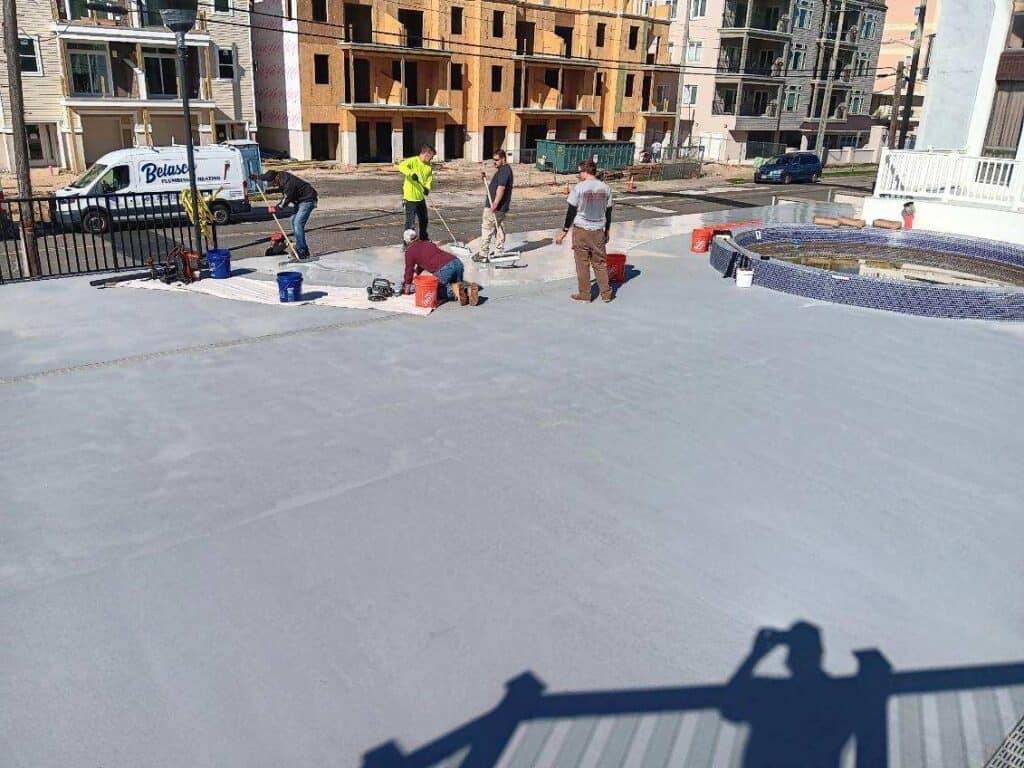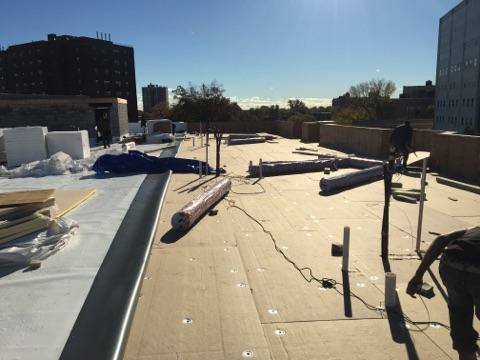TPO Roofing Systems
Thermoplastic Olefin (TPO) roofing is a single-ply membrane roofing system known for its energy efficiency, flexibility, and resistance to UV damage. TPO is ideal for flat or low-slope roofs on commercial buildings, providing excellent protection against heat and chemical exposure while being easy to install and maintain.
Roof Coating Systems
Roof coating systems are applied as a liquid membrane over an existing roof, forming a seamless protective barrier. These coatings can extend the life of a roof, enhance UV protection, and improve waterproofing. They’re often a cost-effective solution for commercial properties looking to avoid a full roof replacement.
Metal Roofing Systems
Metal roofing is highly durable, energy-efficient, and weather-resistant, making it a solid choice for long-term performance in all climates. Available in various metals and profiles, metal roofing can be tailored to complement building aesthetics while offering enhanced fire resistance and structural integrity.
EPDM Roofing Systems
Ethylene Propylene Diene Monomer (EPDM) roofing, also called rubber roofing, is known for its durability and flexibility. Resistant to extreme temperatures and UV rays, EPDM is a long-lasting solution for commercial roofs, particularly for low-slope or flat roof installations.
PVC Roofing Systems
Polyvinyl Chloride (PVC) roofing systems are another single-ply solution with superior resistance to chemicals, fire, and moisture. Known for their reflective white surface, PVC membranes are highly energy-efficient and offer strong, reliable waterproofing for flat or low-slope commercial roofs.
Modified Roofing Systems
Modified Bitumen roofing systems are a hybrid built-up roofing option, combining asphalt with reinforcing materials for added strength and flexibility. These roofs provide excellent impact resistance and work well in extreme weather conditions, making them a popular choice for high-performance commercial roofing.
SBS Cold Process Roofing
Styrene-Butadiene-Styrene (SBS) cold process roofing systems use modified bitumen applied without the use of open flame or hot asphalt. The cold application process enhances flexibility and crack resistance, providing a strong, seamless membrane that stands up well in various weather conditions.
Hot Tar Systems
Hot tar, or built-up roofing (BUR) systems, consist of alternating layers of asphalt and reinforcing materials. Known for their excellent fire resistance and durability, these roofs are ideal for flat commercial roofs and provide excellent waterproofing with multi-layer protection.
Torch Roofing Systems
Torch-applied roofing involves using a flame to adhere modified bitumen to the roof, creating a seamless, waterproof membrane. This method is ideal for situations requiring high performance and durability, particularly in areas subject to harsh weather conditions.
Polyurethane/Foam Roofing Systems
Polyurethane foam roofing systems involve applying a spray foam to the roof surface, followed by a protective coating. Known for their insulation properties and seamless, leak-resistant barrier, foam roofs are an energy-efficient option that adapts well to various commercial roof shapes and slopes.
Shingle Roofing Systems
Shingle roofing is a versatile option that combines durability with traditional aesthetics, often suited for steep-slope commercial properties. Shingles come in various materials, including asphalt and architectural styles, and offer strong resistance to wind and weather. Shingle roofs are relatively low-maintenance and easy to repair, making them popular for both new installations and replacement projects.
Rubberized Slate Roofing Systems
Rubberized slate roofing mimics the appearance of natural slate but is made from durable rubber compounds, often recycled materials. This system offers the elegance of slate with added flexibility, impact resistance, and a lower cost. Rubberized slate is lighter than real slate, making it suitable for a range of commercial building structures without requiring additional support.




